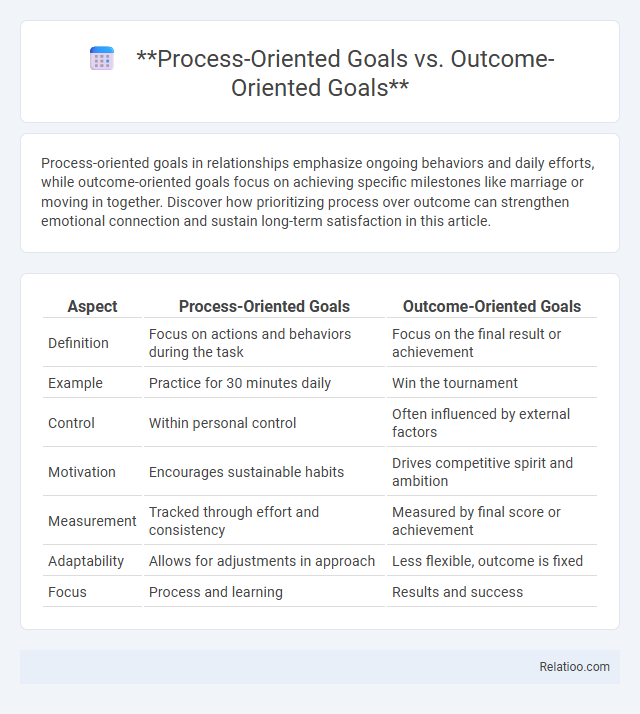Process-oriented goals in relationships emphasize ongoing behaviors and daily efforts, while outcome-oriented goals focus on achieving specific milestones like marriage or moving in together. Discover how prioritizing process over outcome can strengthen emotional connection and sustain long-term satisfaction in this article.
Table of Comparison
| Aspect | Process-Oriented Goals | Outcome-Oriented Goals |
|---|---|---|
| Definition | Focus on actions and behaviors during the task | Focus on the final result or achievement |
| Example | Practice for 30 minutes daily | Win the tournament |
| Control | Within personal control | Often influenced by external factors |
| Motivation | Encourages sustainable habits | Drives competitive spirit and ambition |
| Measurement | Tracked through effort and consistency | Measured by final score or achievement |
| Adaptability | Allows for adjustments in approach | Less flexible, outcome is fixed |
| Focus | Process and learning | Results and success |
Understanding Process-Oriented Goals
Process-oriented goals emphasize the actions and behaviors necessary to achieve success, focusing on consistent effort and skill development rather than solely on end results. Understanding these goals helps you maintain motivation and adaptability by valuing progress and learning throughout the journey. This approach contrasts with outcome-oriented goals, which stress final achievements, and value clarification, which involves identifying core personal principles guiding your decisions.
Defining Outcome-Oriented Goals
Outcome-oriented goals emphasize specific, measurable results within a defined timeframe, contrasting with process-oriented goals that prioritize actions and habits. Defining outcome-oriented goals requires clarity on desired end states, quantifiable criteria for success, and alignment with broader objectives or values. Integrating value clarification helps ensure these goals reflect personal or organizational priorities, fostering motivation and meaningful achievement.
Key Differences Between Process and Outcome Goals
Process-oriented goals emphasize specific actions and behaviors needed to achieve success, focusing on controllable steps and continuous improvement. Outcome-oriented goals target the end result or final achievement, often influenced by external factors beyond one's control. Value clarification helps align both goal types with personal beliefs and priorities, ensuring motivation and meaningful progress.
Benefits of Setting Process-Oriented Goals
Setting process-oriented goals enhances focus on controllable actions, fostering consistent progress and skill development. This approach reduces anxiety linked to outcome uncertainty, promoting resilience and motivation through actionable steps. Emphasizing process over outcomes aligns efforts with intrinsic values, improving long-term engagement and personal growth.
Advantages and Risks of Outcome-Oriented Goals
Outcome-oriented goals provide clear targets and measurable success criteria, which can motivate you and enhance focus on end results. However, these goals carry the risk of neglecting the process, leading to stress or unethical shortcuts when the desired outcomes appear distant or challenging. Aligning outcome goals with value clarification ensures that your long-term vision drives meaningful and sustainable achievements.
How Process Goals Enhance Motivation and Consistency
Process-oriented goals enhance motivation and consistency by emphasizing daily actions and behaviors that are within Your control, fostering a sense of progress and reducing overwhelm. Unlike outcome-oriented goals that focus on specific results, process goals create sustainable habits that align with intrinsic values and long-term aspirations. This alignment helps clarify what truly matters to You, boosting persistence and driving continuous improvement.
Balancing Process and Outcome Goals for Success
Balancing process-oriented goals, which emphasize daily habits and actions, with outcome-oriented goals, focused on specific end results, is crucial for sustained success and motivation. Integrating value clarification ensures that both goal types align with personal or organizational core beliefs, enhancing commitment and meaningful progress. This holistic approach fosters resilience by maintaining focus on controllable behaviors while tracking measurable achievements tied to intrinsic values.
Common Mistakes in Goal Setting
Confusing process-oriented goals with outcome-oriented goals often leads to unrealistic expectations, as outcome goals depend heavily on external factors beyond Your control. A common mistake in goal setting is neglecting value clarification, which ensures alignment between what You aim for and Your core beliefs, driving sustained motivation. Failing to distinguish these goal types can result in frustration, lack of progress, and diminished commitment.
Strategies to Shift from Outcome to Process Focus
Shifting from outcome-oriented goals to process-oriented goals involves emphasizing actionable steps and daily habits over end results, enabling sustained motivation and adaptability. You can implement strategies such as setting specific process milestones, practicing mindfulness to stay engaged in the present task, and regularly reflecting on progress rather than fixating on final achievements. Integrating value clarification helps align your process goals with core personal principles, ensuring your efforts remain meaningful and intrinsically driven.
Choosing the Right Goal Type for Long-Term Achievement
Process-oriented goals emphasize daily actions and habits, fostering consistent progress and intrinsic motivation essential for sustainable success. Outcome-oriented goals target specific end results, providing clear benchmarks but often risking discouragement if progress stalls. Value clarification aligns goal setting with personal beliefs and priorities, ensuring motivation remains authentic and goals chosen support long-term fulfillment and achievement.

Infographic: Process-Oriented Goals vs Outcome-Oriented Goals
 relatioo.com
relatioo.com